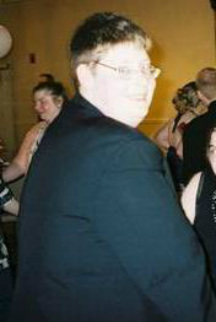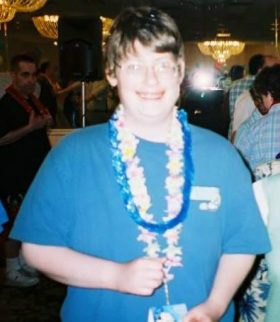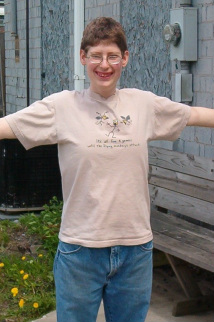Prader-Willi Syndrome
For 50 years, Keystone Community Resources, Inc., has been providing services and supports to individuals with Intellectual Disabilities and Developmental Disabilities. Over the last two decades, we have expanded our residential programs to include serving people with a special type of disability: Prader-Willi Syndrome.
About Prader-Willi Syndrome
Prader-Willi Syndrome is a group of symptoms caused by a genetic defect in Chromosome 15. The symptoms include many, although not all of the following:
About Prader-Willi Syndrome
Prader-Willi Syndrome is a group of symptoms caused by a genetic defect in Chromosome 15. The symptoms include many, although not all of the following:
- Insatiable appetite, beginning somewhere between ages 2 and 5. Since individuals with PWS have a metabolism which is only 60% of normal, they require fewer calories to maintain weight. An uncontrollable preoccupation with food usually leads to obesity, serious health problems, and early death unless access to food is strictly controlled. With adequate supervision and careful control of food intake, persons with PWS can maintain a healthy weight.
- Short stature, with adults reaching about five feet in height. Other physical characteristics include small hands, feet, and a narrow forehead.
- Scratching and picking is common due to increased pain tolerance and decreased sensory input.
- Central Nervous System malfunctions including impaired body control and intellectual disability with an average IQ score of 70.
- Dysfunction of the hypothalamus affecting physical growth, sexual development, appetite, temperature control, and emotional stability.
- Hypotonia during infancy with poor motor control, weak cry, and poor sucking ability. Although children get stronger as they grow older, muscle tone usually remains lower than normal.
- Behavioral difficulties usually begin in early childhood and persist throughout adult life. These difficulties include behavioral outbursts, uncooperativeness, and resistance to transitions.
About Our Services

People with Prader-Willi Syndrome often experience difficulties at home or in a residential setting. Despite these challenges, Keystone Community Resources has been able to provide individuals with PWS a safe and stable environment to learn, grow, become, and stay healthy. The daily life of Keystone’s Prader-Willi Program involves a structured blend of social, recreational and behavioral support in which staff perform therapeutic support services. Activity schedules include planned leisure and recreation, training in activities of daily living, and an emphasis on developing and enhancing appropriate social and behavioral interactions. Homes are kept to the size of 4 to 5 individuals so as to not overwhelm those who are uncomfortable with large groups. Each home offers individual bedrooms for most residents.
The program offers the following:
The professional staff at Keystone are involved in the national and state chapters of the Prader-Willi Syndrome Association and are regularly represented at conferences to keep abreast of current practices. In the home, controls have been added to the living environment to assist residents in meeting their needs, such as access to both the refrigerator and food cabinets. Access to these locations is secured in PWS homes at all times.
The emphasis on weight loss/weight control is likely the most evident measure of Keystone’s success in supporting persons with Prader-Willi Syndrome. During the duration of stay, the average weight loss of participants in the PWS program is 83.3 pounds, with a record of 129.75 pounds lost!
The program offers the following:
- Specialized training modules on PWS for all direct service professionals.
- Nursing services for coordination of health care needs.
- Physician services through the community.
- Behavioral support services for identification, monitoring and development of behavioral needs.
- Therapeutic services to include individualized interaction to focus on major life stressors.
The professional staff at Keystone are involved in the national and state chapters of the Prader-Willi Syndrome Association and are regularly represented at conferences to keep abreast of current practices. In the home, controls have been added to the living environment to assist residents in meeting their needs, such as access to both the refrigerator and food cabinets. Access to these locations is secured in PWS homes at all times.
The emphasis on weight loss/weight control is likely the most evident measure of Keystone’s success in supporting persons with Prader-Willi Syndrome. During the duration of stay, the average weight loss of participants in the PWS program is 83.3 pounds, with a record of 129.75 pounds lost!
Below is an example of a individual's weight loss over a span of only 2 years.
|
For more information regarding our Prader-Willi Program, please contact our Admissions Coordinator.
|
Beacon Specialized Living
Beacon Specialized Living-Keystone • 100 Abington Executive Park, Clarks Summit, PA 18411 • Phone: 570-702-8000 Fax: 570-702-8093
If you have an emergency, please call 911. If you have a consumer related emergency please call our emergency on-call number at 570-702-8107.
Copyright © 2008 Beacon Specialize Living-Keystone - All rights reserved
Site Map | Home
Beacon Specialized Living-Keystone • 100 Abington Executive Park, Clarks Summit, PA 18411 • Phone: 570-702-8000 Fax: 570-702-8093
If you have an emergency, please call 911. If you have a consumer related emergency please call our emergency on-call number at 570-702-8107.
Copyright © 2008 Beacon Specialize Living-Keystone - All rights reserved
Site Map | Home



